题型组合练 完成句子+选词填空 八年级下册英语期末复习 牛津译林版(含解析)
文档属性
| 名称 | 题型组合练 完成句子+选词填空 八年级下册英语期末复习 牛津译林版(含解析) | 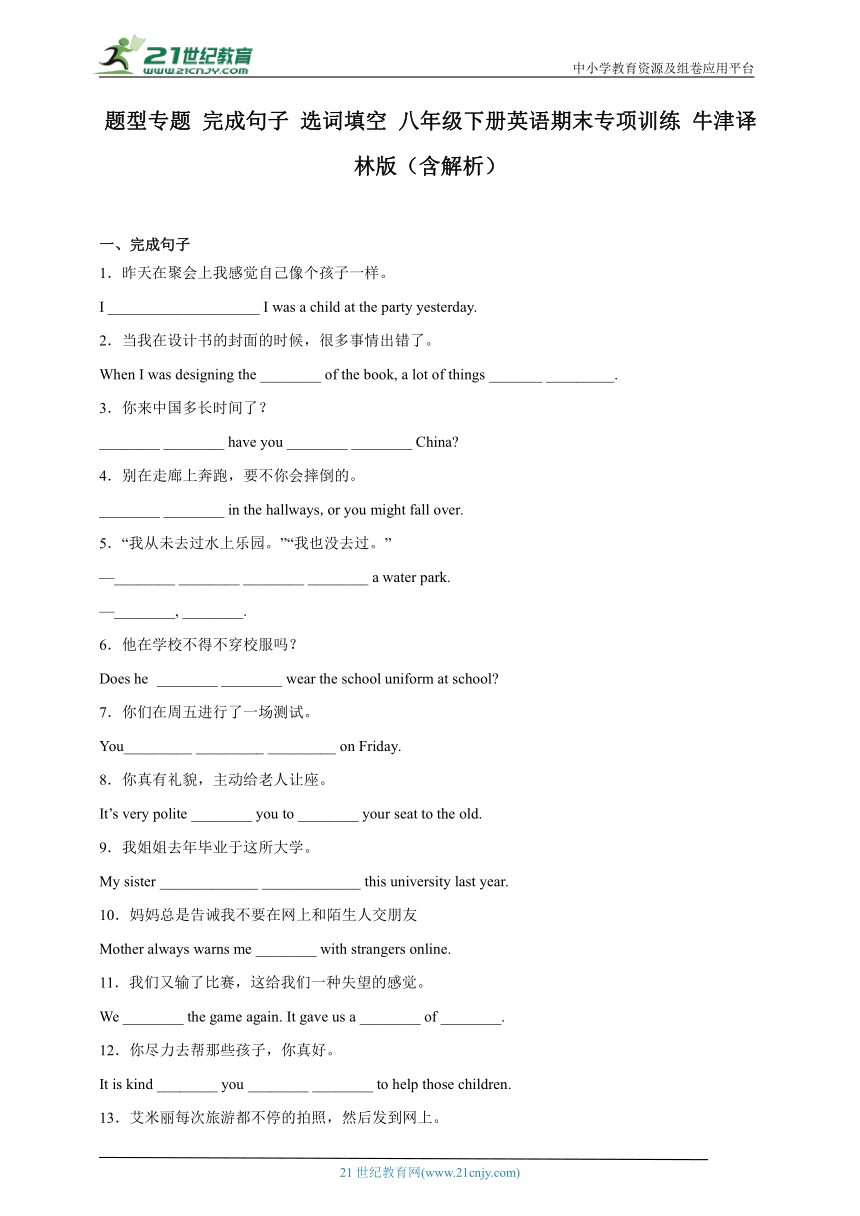 | |
| 格式 | doc | ||
| 文件大小 | 875.7KB | ||
| 资源类型 | 试卷 | ||
| 版本资源 | 牛津译林版 | ||
| 科目 | 英语 | ||
| 更新时间 | 2023-05-30 15:47:09 | ||
图片预览

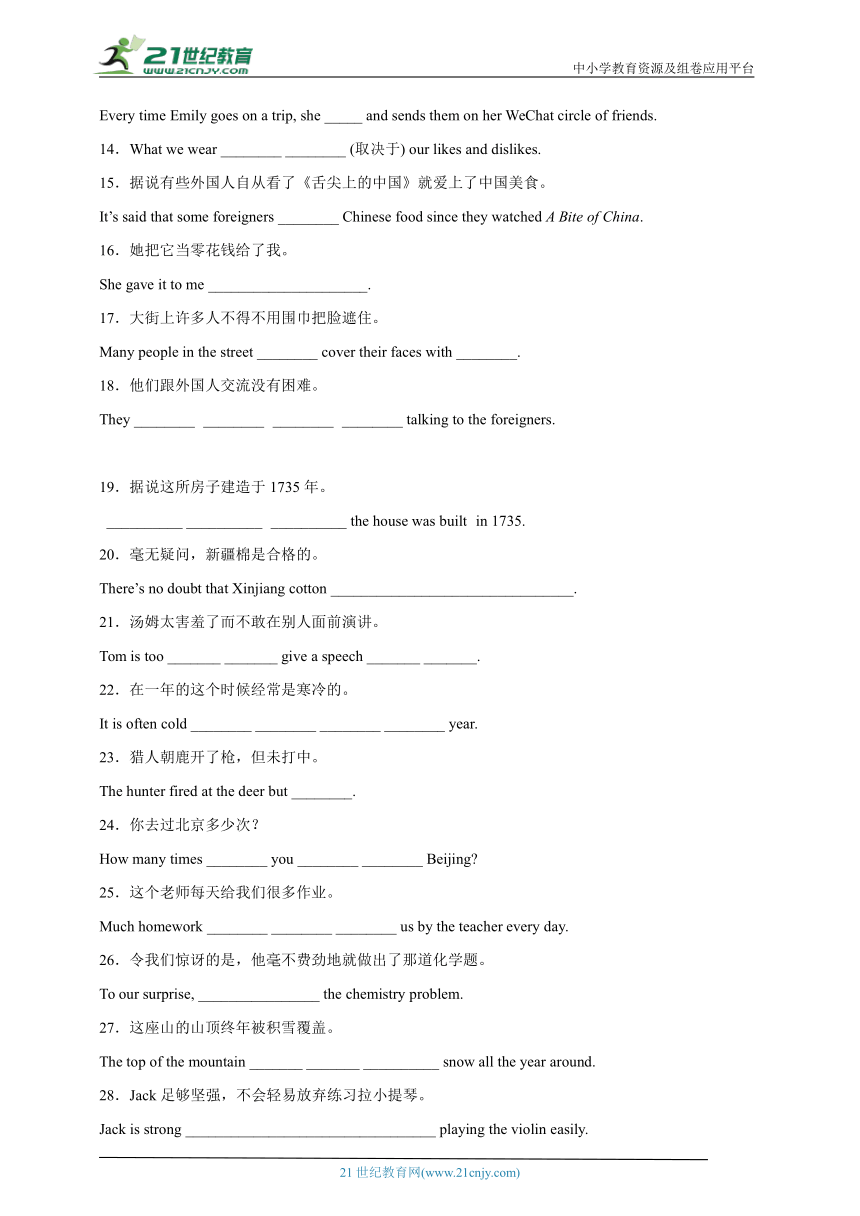
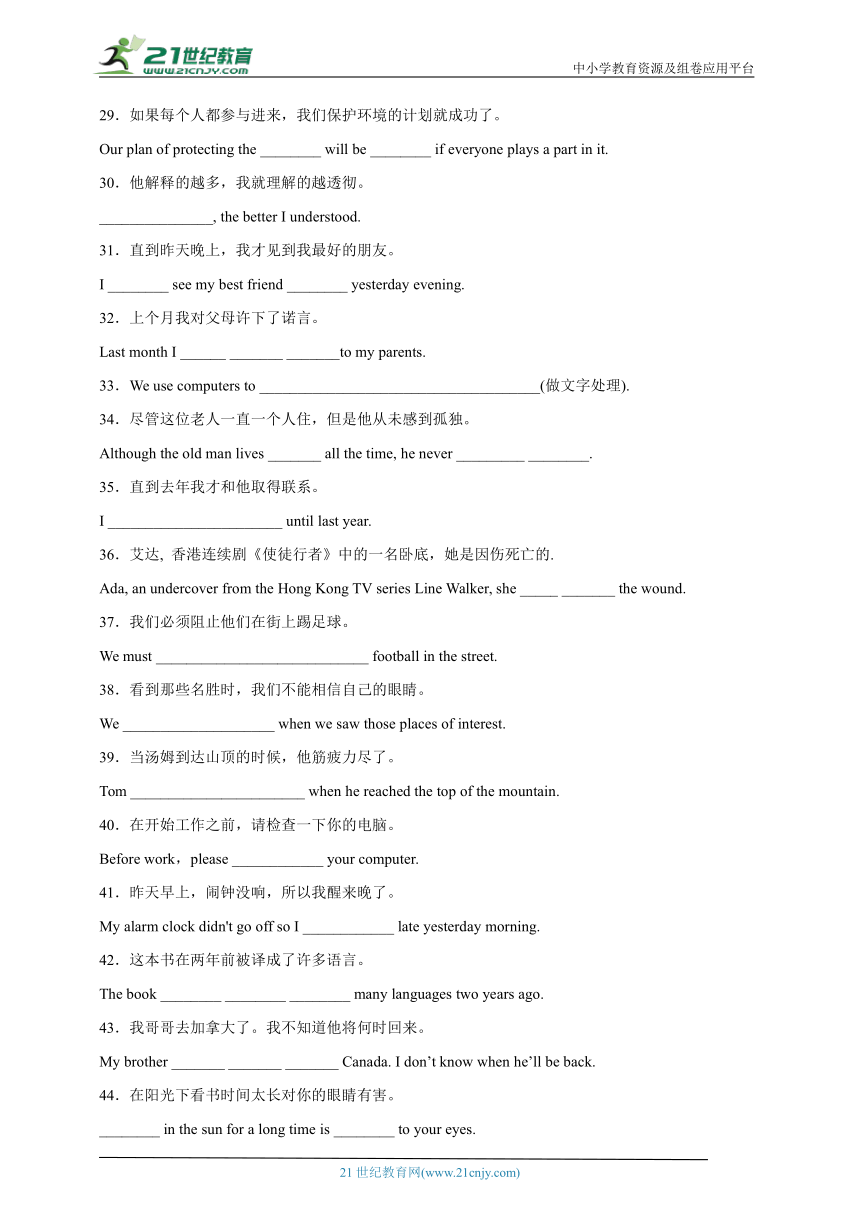
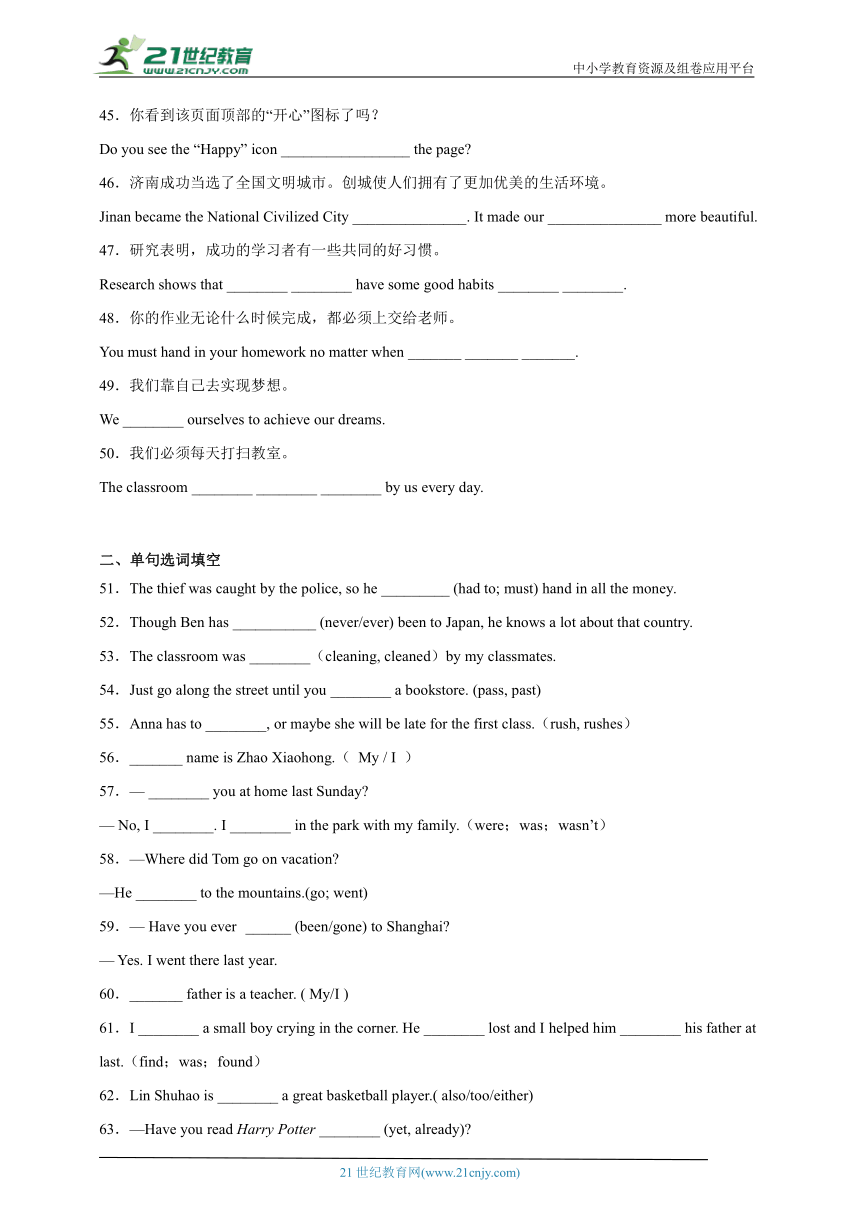
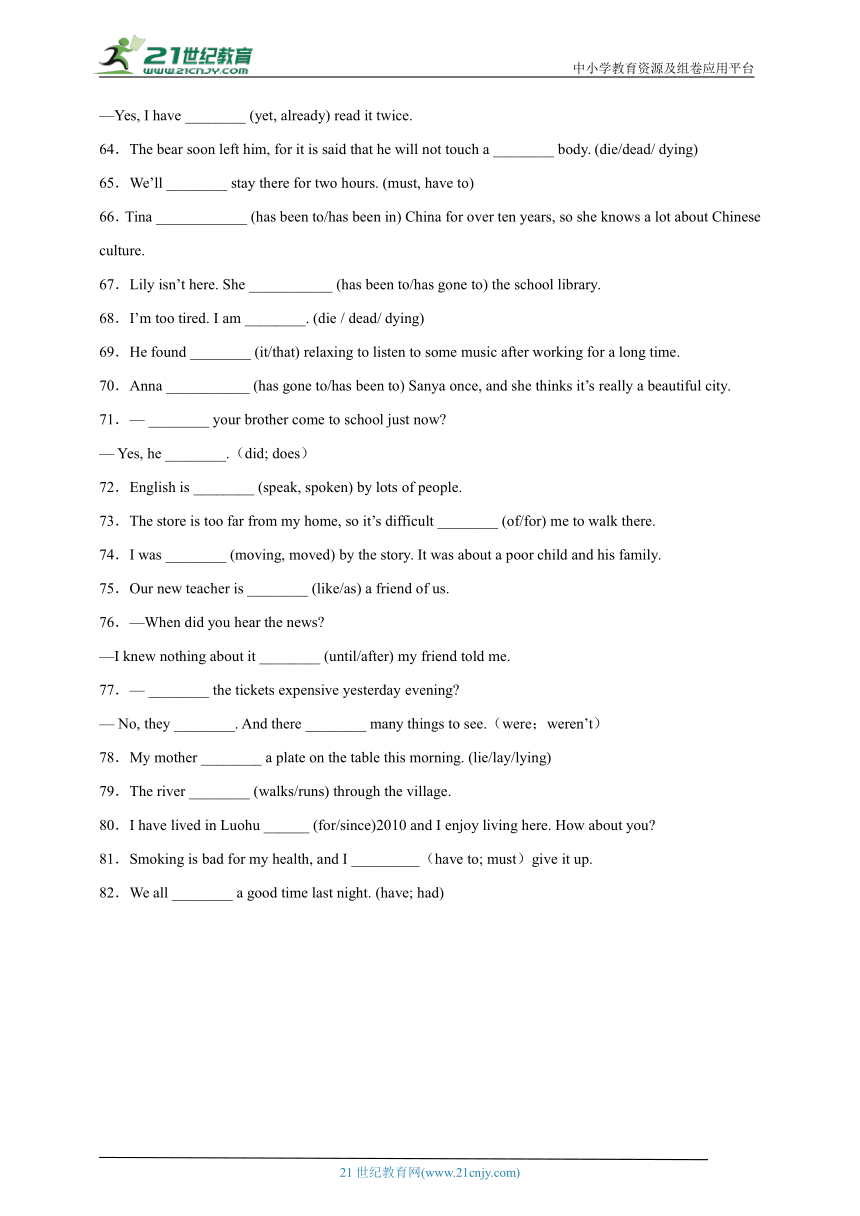
文档简介
中小学教育资源及组卷应用平台
题型专题 完成句子 选词填空 八年级下册英语期末专项训练 牛津译林版(含解析)
一、完成句子
1.昨天在聚会上我感觉自己像个孩子一样。
I ____________________ I was a child at the party yesterday.
2.当我在设计书的封面的时候,很多事情出错了。
When I was designing the ________ of the book, a lot of things _______ _________.
3.你来中国多长时间了?
________ ________ have you ________ ________ China
4.别在走廊上奔跑,要不你会摔倒的。
________ ________ in the hallways,or you might fall over.
5.“我从未去过水上乐园。”“我也没去过。”
—________ ________ ________ ________ a water park.
—________, ________.
6.他在学校不得不穿校服吗?
Does he ________ ________ wear the school uniform at school
7.你们在周五进行了一场测试。
You_________ _________ _________ on Friday.
8.你真有礼貌,主动给老人让座。
It’s very polite ________ you to ________ your seat to the old.
9.我姐姐去年毕业于这所大学。
My sister _____________ _____________ this university last year.
10.妈妈总是告诫我不要在网上和陌生人交朋友
Mother always warns me ________ with strangers online.
11.我们又输了比赛,这给我们一种失望的感觉。
We ________ the game again. It gave us a ________ of ________.
12.你尽力去帮那些孩子,你真好。
It is kind ________ you ________ ________ to help those children.
13.艾米丽每次旅游都不停的拍照,然后发到网上。
Every time Emily goes on a trip, she _____ and sends them on her WeChat circle of friends.
14.What we wear ________ ________ (取决于) our likes and dislikes.
15.据说有些外国人自从看了《舌尖上的中国》就爱上了中国美食。
It’s said that some foreigners ________ Chinese food since they watched A Bite of China.
16.她把它当零花钱给了我。
She gave it to me _____________________.
17.大街上许多人不得不用围巾把脸遮住。
Many people in the street ________ cover their faces with ________.
18.他们跟外国人交流没有困难。
They ________ ________ ________ ________ talking to the foreigners.
19.据说这所房子建造于1735年。
__________ __________ __________ the house was built in 1735.
20.毫无疑问,新疆棉是合格的。
There’s no doubt that Xinjiang cotton ________________________________.
21.汤姆太害羞了而不敢在别人面前演讲。
Tom is too _______ _______ give a speech _______ _______.
22.在一年的这个时候经常是寒冷的。
It is often cold ________ ________ ________ ________ year.
23.猎人朝鹿开了枪,但未打中。
The hunter fired at the deer but ________.
24.你去过北京多少次?
How many times ________ you ________ ________ Beijing
25.这个老师每天给我们很多作业。
Much homework ________ ________ ________ us by the teacher every day.
26.令我们惊讶的是,他毫不费劲地就做出了那道化学题。
To our surprise, ________________ the chemistry problem.
27.这座山的山顶终年被积雪覆盖。
The top of the mountain _______ _______ __________ snow all the year around.
28.Jack足够坚强,不会轻易放弃练习拉小提琴。
Jack is strong _________________________________ playing the violin easily.
29.如果每个人都参与进来,我们保护环境的计划就成功了。
Our plan of protecting the ________ will be ________ if everyone plays a part in it.
30.他解释的越多,我就理解的越透彻。
_______________, the better I understood.
31.直到昨天晚上,我才见到我最好的朋友。
I ________ see my best friend ________ yesterday evening.
32.上个月我对父母许下了诺言。
Last month I ______ _______ _______to my parents.
33.We use computers to _____________________________________(做文字处理).
34.尽管这位老人一直一个人住,但是他从未感到孤独。
Although the old man lives _______ all the time, he never _________ ________.
35.直到去年我才和他取得联系。
I _______________________ until last year.
36.艾达, 香港连续剧《使徒行者》中的一名卧底,她是因伤死亡的.
Ada, an undercover from the Hong Kong TV series Line Walker, she _____ _______ the wound.
37.我们必须阻止他们在街上踢足球。
We must ____________________________ football in the street.
38.看到那些名胜时,我们不能相信自己的眼睛。
We ____________________ when we saw those places of interest.
39.当汤姆到达山顶的时候,他筋疲力尽了。
Tom _______________________ when he reached the top of the mountain.
40.在开始工作之前,请检查一下你的电脑。
Before work,please ____________ your computer.
41.昨天早上,闹钟没响,所以我醒来晚了。
My alarm clock didn't go off so I ____________ late yesterday morning.
42.这本书在两年前被译成了许多语言。
The book ________ ________ ________ many languages two years ago.
43.我哥哥去加拿大了。我不知道他将何时回来。
My brother _______ _______ _______ Canada. I don’t know when he’ll be back.
44.在阳光下看书时间太长对你的眼睛有害。
________ in the sun for a long time is ________ to your eyes.
45.你看到该页面顶部的“开心”图标了吗?
Do you see the “Happy” icon _________________ the page
46.济南成功当选了全国文明城市。创城使人们拥有了更加优美的生活环境。
Jinan became the National Civilized City _______________. It made our _______________ more beautiful.
47.研究表明,成功的学习者有一些共同的好习惯。
Research shows that ________ ________ have some good habits ________ ________.
48.你的作业无论什么时候完成,都必须上交给老师。
You must hand in your homework no matter when _______ _______ _______.
49.我们靠自己去实现梦想。
We ________ ourselves to achieve our dreams.
50.我们必须每天打扫教室。
The classroom ________ ________ ________ by us every day.
二、单句选词填空
51.The thief was caught by the police, so he _________ (had to; must) hand in all the money.
52.Though Ben has ___________ (never/ever) been to Japan, he knows a lot about that country.
53.The classroom was ________(cleaning, cleaned)by my classmates.
54.Just go along the street until you ________ a bookstore. (pass, past)
55.Anna has to ________, or maybe she will be late for the first class.(rush, rushes)
56._______ name is Zhao Xiaohong.( My / I )
57.— ________ you at home last Sunday
— No, I ________. I ________ in the park with my family.(were;was;wasn’t)
58.—Where did Tom go on vacation
—He ________ to the mountains.(go; went)
59.— Have you ever ______ (been/gone) to Shanghai
— Yes. I went there last year.
60._______ father is a teacher. ( My/I )
61.I ________ a small boy crying in the corner. He ________ lost and I helped him ________ his father at last.(find;was;found)
62.Lin Shuhao is ________ a great basketball player.( also/too/either)
63.—Have you read Harry Potter ________ (yet, already)
—Yes, I have ________ (yet, already) read it twice.
64.The bear soon left him, for it is said that he will not touch a ________ body. (die/dead/ dying)
65.We’ll ________ stay there for two hours. (must, have to)
66.Tina ____________ (has been to/has been in) China for over ten years, so she knows a lot about Chinese culture.
67.Lily isn’t here. She ___________ (has been to/has gone to) the school library.
68.I’m too tired. I am ________. (die / dead/ dying)
69.He found ________ (it/that) relaxing to listen to some music after working for a long time.
70.Anna ___________ (has gone to/has been to) Sanya once, and she thinks it’s really a beautiful city.
71.— ________ your brother come to school just now
— Yes, he ________.(did; does)
72.English is ________ (speak, spoken) by lots of people.
73.The store is too far from my home, so it’s difficult ________ (of/for) me to walk there.
74.I was ________ (moving, moved) by the story. It was about a poor child and his family.
75.Our new teacher is ________ (like/as) a friend of us.
76.—When did you hear the news
—I knew nothing about it ________ (until/after) my friend told me.
77.— ________ the tickets expensive yesterday evening
— No, they ________. And there ________ many things to see.(were;weren’t)
78.My mother ________ a plate on the table this morning. (lie/lay/lying)
79.The river ________ (walks/runs) through the village.
80.I have lived in Luohu ______ (for/since)2010 and I enjoy living here. How about you
81.Smoking is bad for my health, and I _________(have to; must)give it up.
82.We all ________ a good time last night. (have; had)
参考答案:
1.felt like/felt like that
【详解】根据句意可知,空处少“感觉像”,英语表达为“feel like”,后可以跟从句,其中引导词that可以省略;根据时间状语yesterday可知是一般过去时态,feel的过去式是felt。故填felt like/felt like that。
2. cover went wrong
【详解】cover名词,封面;go wrong出错;根据前文was可知,谓语代词使用过去式went。所以答案为:went wrong。
3. How long been in
【详解】根据中英文可知,此处空对应的中文为“多长时间”和“来”,how long表示“多长时间”,have been in表示“呆在某个地方”,首字母大写。故填How;long;been;in。
4. Don’t run
【详解】run“跑步”,此句是否定祈使句,结构为“don’t+动词原形”,故填Don’t;run。
5. I’ve never been to Me neither
【详解】I“我”;never“从不”;固定短语have been to“去过(某地)”。如果前面别人说的话是否定句,其他人想要表示同样的意思可以用固定短语Me neither“我也不/没……”。故填I’ve;never;been;to;Me;neither。
6. have to
【详解】根据汉语和所给的英语提示可知,此处缺少了“不得不”的翻译,不得不:have to,此处用的是一般现在时,句首有助动词Does,所以此处动词用原形,故填have to。
7. had a test
【详解】由时间状语on Friday和语境,可知句子使用一般过去时,主语是you,后接动词作谓语,have a test是动词短语,意为“进行一场测试”。故填had;a;test。
8. of offer
【详解】固定句式:It is+形容词+for/of sb to do sth“某人做某事是……的”,当形容词是修饰人,介词用of,当形容词是修饰物,介词用for。polite是修饰人,所以第一空填of;offer“主动提供”,动词不定式符号to后接动词原形,故填of;offer。
9. graduated from
【详解】graduate from毕业于,根据last year可知此处用一般过去时,故为(1). graduated (2). from。
10.not to make friends
【详解】根据汉语和英文对照可知,空格处填“不要交朋友”。短语warn sb. (not) to do sth.告诫/提醒某人(不)要做某事,make friends with sb.和某人交朋友。故填not to make friends。
11. lost sense disappointment
【详解】lose“输”,动词,根据“It gave us”可知,此句应该用一般过去时,lose的过去式为lost;a sense of disappointment“失望的感觉”。故填lost;sense;disappointment。
12. of to try
【详解】本句中形容词kind修饰you,所以用“It is kind of sb to do sth”句型,try to do sth“尽力做某事”,故填of;to;try。
13.can’t stop taking photos
【详解】根据中英文对比可知,空格处应填意为“不停的拍照”的短语。can’t stop doing sth.为固定搭配,意为“不能停止做某事”,take photos意为“拍照片”,故此处应用take的ing形式。故填can’t stop taking photos。
14. depends on
【详解】我们穿什么取决于我们的好恶。取决于:depend on,固定短语;句子陈述客观事实,时态使用一般现在时,主语是主语从句,谓语动词用第三人称单数。故填depends;on。
15.have been in love with
【详解】根据“since they watched A Bite of China.”可知句子时态用现在完成时,动词用延续性动词be in love with“爱上”,现在完成时的构成是:have/has+动词的过去分词,主语是复数,用have,be的过去分词是been;故填have been in love with。
16.as pocket money
【详解】根据中英文对照,此处缺少:当作:as;零花钱:pocket money。money为不可数名词。故填as pocket money。
17. have to scarves
【详解】对比给出中英文可知英文句子缺“不得不”和“围巾”的表达。根据给出中文可知句子时态为一般现在时,主语“Many people”是复数,谓语动词用原形;have to表示“不得不”,在句中作谓语;scarf表示“围巾”,由于主语是复数,所以scarf也要变成复数形式scarves,故填have to;scarves。
18. didn’t have a problem
【详解】根据所给汉语意思可知,应该填的是“没有困难”,have a problem (in) doing sth“做某事有困难”,have是实义动词且时态是一般过去时,所以用助动词didn’t加动词原形have表示“没有”,故填didn’t;have;a;problem。
19. It’s said that
【详解】由题干可知本题考查固定句式:It's said that+句子,It's said意思是“据说”,后接that从句,这里的it是形式主语,真正的主语是that引导的从句,该从句称为主语从句,故答案填(1). It’s (2). said (3). that
20.is up to standard
【详解】表示“合格的”用短语“be up to standard”。句子是一般现在时,主语 “Xinjiang cotton”是单数,be动词是“is”。故填is up to standard。
21. shy to in public
【详解】“太……而不能……”too+adj.+to do;“害羞”shy,形容词;“在别人面前演讲”也就是“当众演讲”,用in public表示“当众”,固定短语,在句中作状语。故填shy;to;in;public。
22. at this time of
【详解】固定搭配:at this time of year“在一年的这个时候”,故填at;this;time;of。
23.missed
【详解】未打中miss。but连接并列谓语,根据“fired”可知要用动词的过去式missed。故填missed。
24. have been to
【详解】根据句意及语境可知,此题时态为现在完成时,且缺少“去过”,表示去了回来了,可以用have/has been to表示。主语为you,谓语用have been to形式。故填have;been;to。
25. is given to
【详解】该句的主语是Much homework,谓语动词give,give sth. to sb.给某人某物。根据句意可知,主语和动词构成被动关系,应用被动语态。根据句中的every day可知,这句话应用一般现在时态,主语为不可数名词,故应填is given to。
26.he had no difficulty working out/he had no difficulty solving
【详解】have no difficulty doing sth毫不费劲地做某事;work out=solve解决,结合句意,表示做出了那道化学题,用一般过去时,故填he had no difficulty working out/solving。
27. is covered with
【详解】be covered with…是一个固定短语,意为“覆盖着…”。根据句意和句中的时间状语all the year around可知,这句话应用一般现在时态,主语The top of the mountain是单数,故应填is covered with。
28.enough not to give up practising
【详解】通过中英文句子对照可知,英文句子中缺少“足够坚强,不会轻易放弃”的表达;“足够坚强”英文表达是strong enough;“不会轻易放弃”英文表达是not to give up;“练习”practise,“give up doing sth”放弃做某事;故答案填enough not to give up practising。
29. environment successful
【详解】根据句子结构可知第一空应填“环境”,environment意为“环境”。第二空前有be动词,构成主系表结构,根据句意和结构可知这里要填形容词“成功的”,successful意为“成功的”,故填environment;successful。
30.The more he explained
【详解】“the+比较级 ... , the+比较级 ...”意为“越……就越……”,“越多”用比较级more;“解释”译为explain;“他”作主语,译为he。根据“understood”可知用一般过去时,explain的过去式为explained。故填The more he explained。
31. didn’t until
【详解】not...until...“直到……才”,结合“yesterday evening”可知,句子应用一般过去时,否定用助动词did,与not缩写成didn’t,故填didn’t;until。
32. made a promise
【详解】根据汉语缺少“许下了诺言”,短语make a promise to sb.表示对某人许诺。由“last month”可知,句子用一般过去时,故填made a promise。
33.do word processing
【详解】do word procession做文字处理,位于动词不定式符号to后,故用动词原形,故此处为do word processing。
34. alone feels lonely
【详解】动词“lives”用副词修饰,表达“一个人住”用副词“alone”。句子是一般现在时,主语“he”是第三人称单数,表达“感到”动词用三单形式“feels”。表达“孤独”用形容词“lonely”做表语。故填alone;feels;lonely。
35.didn’t get in touch with him
【详解】本题考查not …until的用法,直到……才……;与……取得联系用短语“get in touch with”表示;last year表示该题的时态为过去时。故答案为didn't get in touch with him
36. died of
【详解】根据句意可知,缺少“因……死亡”部分。英语中表达这一意思可用die of死于内因或者die from死于外因,这里是死于疾病,属于内因。在通过句意,这件事情已经发生过了,用一般过去时,故填 died;of。
37.stop them from playing
【详解】stop sb. from doing sth.表示“阻止某人做某事”;play football“踢足球”,是固定短语;them“他们”,宾格代词。情态动词must后接原形动词,故填stop them from playing
38.couldn’t believe our eyes
【详解】根据汉语提示可知缺少部分为“不能相信自己的眼睛”,根据后面的“saw”可知“不能”应用“couldn’t”;“相信”译为“believe”,位于情态动词后用原形即可;主语是“We”,因此“自己的”用形容词性物主代词“our”;“眼睛”译为“eyes”,用复数。故填couldn’t believe our eyes。
39.was tired out
【详解】根据“when he reached the top of the mountain”可知,空处所在句子时态为一般过去时;固定短语be tired out意为“筋疲力尽”,Tom作主语,be动词用was。故填was tired out。
40.check out
【详解】分析句子可知,空格处填“检查一下”,check out检查,了解清楚,核实。此句是祈使句,其构成是please do sth.,由此可知,空格处填动词原形。故填check out。
41.woke up
【详解】wake up醒来, yesterday morning昨天早上,用过去时态,wake的过去式是woke;故填woke up。
42. was translated into
【详解】考查固定搭配,translate...into...意为“把……翻译成……”,此处主语The book与谓语translate是逻辑上的动宾关系,因此用被动语态;又根据“two years ago”可知是一般过去时,因此是一般过去时的被动语态;主语The book是单数,因此be动词是was。故填was;translated;into。
43. has gone to
【详解】根据所给汉语可知,空格处表示的是“去了”。根据“I don’t know when he’ll be back.”可知是去了还没回来,要用have gone to“去了没回来”,又因为主语my brother为第三人称单数,故填has;gone;to。
44. Reading harmful
【详解】根据句意,第一空需翻译的是“看书”,即“read”,此处位于句首且在句中作主语,故需用动名词形式并且首字母需大写,故第一空填“Reading”;第二空需翻译的是“有害的”,即“harmful”,构成短语“be harmful to”,意为“对……有害”,故第二空填“harmful”。综上,本题答案为Reading;harmful。
45.at the top of
【详解】在……顶部:at the top of...。故填at the top of。
46. successfully living environment
【详解】根据中英文对比可知,空格处应填意为“成功地”副词和意为“生活环境”的短语。successfully作副词,意为“成功地”,名词词组living environment意为“生活环境”,符合句意,故填successfully;living environment。
47. successful learners in common
【详解】“成功的学习者”是名词短语successful learner,根据“have”可知主语应用名词learner的复数形式learners;“共同的”可用介词短语in common作后置定语修饰名词habits。故填successful;learners;in;common。
48. it is finished
【详解】通过中英文句子的对照可知,英文句子中缺少“你的作业完成”的表达;由题干可知本句时态用一般现在时,主语是your homework,因为上文已经提到过所以此处用it来代替;your homework和动词“完成”finish之间存在被动关系,所以应用被动语态,即be+动词过去分词,主语是it,be动词用is,finish的过去分词是finished;故答案填(1). it (2). is (3). finished。
49.depend on
【详解】固定搭配:depend on表示“依靠”,句子是一般现在时,主语we是第一人称,动词用原形,故填depend on。
50. must be cleaned
【详解】必须:must;打扫:clean;主语The classroom和谓语clean up之间是被动关系,且句中含有情态动词,故此处用含有情态动词的被动语态must be done。故填must;be;cleaned。
51.had to
【详解】句意:小偷被警察抓住了,所以他不得不上交所有的钱。had to不得不,强调客观需要;must必须,强调主观意愿。根据上文“The thief was caught by the police”,可知小偷上交钱是客观所迫的,故填had to。
52.never
【详解】句意:虽然本从未去过日本,但他对那个国家了解很多。never“从未”;ever“曾经”。根据“Though”和“he knows a lot about that country.”可知,前后句意上有转折关系,此处指“从未去过日本,但很了解”。故填never。
53.cleaned
【详解】句意:教室被我的同学打扫干净了。classroom和动作clean之间构成被动关系,空处和其前be动词was构成一般过去时的被动语态was done,所以选过去分词cleaned,故填cleaned。
54.pass
【详解】句意:沿着这条街一直走,直到你经过一家书店。分析句子可知,空处所在句子缺少谓语。pass“经过”,动词;past“经过”,介词/副词;又因主语是you,动词需用原形。故填pass。
55.rush
【详解】句意:安娜得赶紧走,否则第一节课她可能会迟到。has to“必须、不得不”,其后加动词原形。故选rush。
56.My
【详解】句意:我的名字是赵晓红。此处作定语修饰name,用形容词性物主代词形式,故选My。
57. Were wasn’t was
【详解】句意:——你上个周日在家吗?——没有,我不在,我和我的家人在公园里。根据“last Sunday”可知,用一般过去时。第一空处主语为you,用were,开头字母要大写;第二空处,根据“No”可知,用一般过去时的否定形式,主语为I,用wasn’t;第三空处根据句意可知,表示“上个周日我和我的家人在公园”,用一般过去时,主语为I,用was。故填Were;wasn’t;was。
58.went
【详解】句意:——Tom去哪度假了?——他去了山上。根据“did”可知,本题时态为一般过去时,所以动词应使用过去式went。故填went。
59.been
【详解】句意:——你曾去过上海么?——是的。我去年去过那里。“have gone to+地点”意为“某人去了某地(还未回来)”;“have been to+地点”意为“曾经去过某地(但现在已不在那儿)”。根据“I went there last year.”可知,此处表示“去过”,应用been。故填been。
60.My
【详解】句意:我的父亲是一名老师。my我的,形容词性物主代词;I我,代词主格。空后是名词father,前用形容词性物主代词。故填My。
61. found was to find/find
【详解】句意:我发现一个小男孩在角落里哭。他迷路了,我最后帮他找到了他的父亲。根据所给词可知,第一个空格所在句说的是发现一个小男孩在角落里哭,考查的是find sb. doing sth“发现某人正在做某事”,根据后文“I helped him”可知,句子叙述的是过去发生的事情,故时态属于一般过去时,故填found;第二个空格所在句考查的是be lost“迷路”,根据“I helped him”可知,空格处要填过去式,根据句中的主语He是第三人称单数,其对应的be动词为was,故第二个空格填was;根据help的用法help sb. (to) do sth“帮助某人做某事”可知,第三个空格所填词为(to) find。故填found;was;(to)find。
62.also
【详解】句意:林书豪也是一名很棒的篮球运动员。also“也”,用于肯定句的句中;too“也”,用于肯定句的句末;either“也”,用于否定句的句末。句子是肯定句,且位置在句中。故选also。
63. yet already
【详解】句意:——你读过《哈利·波特》了吗?——读过,我已经读了两遍了。already“已经”,用于肯定句中;yet“还”,用于否定句或疑问句句末。第一空位于疑问句句末,用yet;第二空位于肯定句句中,用already。故填yet;already。
64.dead
【详解】句意:熊很快就离开了他,因为据说他不会碰尸体。空处修饰其后的名词,应用形容词dead,dead body“尸体”,故填dead。
65.have to
【详解】句意:我们将不得不在那儿待两个小时。“must”侧重与说话者的主观看法,认为有必要或有义务做某事;“have to”侧重于客观需要,含有“不得不”或“被迫”之意;“have to”有人称、数和时态的变化;可用于现在时、过去时或将来时。根据“We’ll”可知是一般将来时,表示“客观上不得不待在那儿”,用“have to”。故填have to。
66.has been in
【详解】句意:蒂娜已经在中国待了十多年了,所以她对中国文化了解很多。has been to曾经去过(某地);has been in“在某地(多长时间)”;根据“ China for over ten years”可知,此处指“在中国待了十多年”,用has been in。故填has been in。
67.has gone to
【详解】句意:莉莉不在这里。她去了学校图书馆。has gone to“去了某地(还未回来)”;has been to“曾经去过(某地)”。根据“Lily isn’t here. ”可知,空处指去了图书馆,还没回来,用has gone to。故填has gone to。
68.dying
【详解】句意:我太累了。我快死了。由“am”可知空格处要么填形容词dead“死去的,死的”,作表语,构成主系表结构,要么填“dying”。I am dead.意为“我死了。”不符合语境。此句表达“累得快要死了”,故填dying。
69.it
【详解】句意:他发现在工作了很长一段时间后听听音乐是很放松的。分析句子可知,本句是固定句型“动词+ it +宾语补足语+不定式(动名词或从句)”结构,it是形式宾语,后面的不定式、动名词、从句等复杂成分是真正宾语。故填it。
70.has been to
【详解】句意:安娜去过三亚一次,她认为三亚真的是一个美丽的城市。根据“Sanya once, and she thinks it’s really a beautiful city.”可知,此处说的是“去过了”,应用have been to,而have gone to表示“去了(未归)”,故填has been to。
71. Did did
【详解】句意:——刚才你的弟弟来学校了吗?——是的,他来了。根据“just now”可知,用一般过去时。第一空处是一般疑问句,用助动词did,开头字母要大写;第二空处,用“did”问,用did回答,故填Did;did。
72.spoken
【详解】句意:英语被很多人说。根据“by”可知,此句是被动语态,此空需要一个过去分词, 因此spoken符合句意。故填spoken。
73.for
【详解】句意:这个商店离我家太远了,所以对于我来说,走路去那里很困难。It is+形容词+for sb.+to do sth.意为“对某人来说做某事怎么样”,该句型中的形容词常与事物的特征有关;It is+形容词+of sb.+to do sth.表示“某人做某事怎样”,该句型中的形容词常与人的性格特点有关。difficult“困难的”,形容事物,表示“走路去商店很难”。故填for。
74.moved
【详解】句意:我被这个故事感动了。讲的是一个贫穷的孩子和他的家庭。根据“by”可知,此句是被动语态,此空需要一个过去分词,因此moved符合句意。故填moved。
75.like
【详解】句意:我们的新老师就像我们的朋友一样。as“作为”;like“像……一样”,介词,后加名词、代词或短语,构成介词短语,a friend of us“我们的一个朋友”,是名词短语;be like“像……” 。故填like。
76.until
【详解】句意:——你什么时候听到这个消息的?——直到我朋友告诉我,我才知道这件事。根据空格前的句子“I knew nothing about it”(我对此一无所知)以及空格后的句子“my friend told me.”(我的朋友告诉我)可推测,句子说的是直到朋友告诉我,我才知道这件事,应该用连词until。after“在……之后”放在此处不符合逻辑。故填until。
77. Were weren’t were
【详解】句意:——昨天晚上票贵吗?——不,不贵,有许多东西可以看。根据“yesterday evening”可知,用一般过去时。第一空处主语为“the tickets”,用were,开头字母要大写;第二空处,根据“No”可知,要否定回答,主语为“they”,用were’t;第三空处,是there be结构,根据“many things”可知,用were。故填Were;weren't;were。
78.laid
【详解】句意:我妈妈今天早上在桌子上放了一个盘子。根据a plate可知,此处指放了一个盘子,lay表示“放置”,根据this morning可知,此空应填动词过去式,故填laid。
79.runs
【详解】句意:这条河流经村庄。walk强调“步行”的方式,主语一般为人;run则强调“流经,穿过”的动作,主语可为人或物。本句中是强调“这条河流经村庄”的动作,且主语为“The river”为物,所以用runs更合适。 故填runs。
80.since
【详解】句意:我从2010年起就住在罗湖,我喜欢住在这里。你呢?for后跟一段时间,since后跟时间点,“2010”是一个时间点,应该用since表示“自从”。故填since。
81.must
【详解】句意:吸烟对我的健康有害,我必须戒掉它。must必须,应该,表示个人意志和主观上的必要;have to不得不,侧重于客观上的必要,根据语境可知,此处表示个人意志和主观上的必要,故填must。
82.had
【详解】句意:昨晚我们都玩得很开心。have是一般现在时形式;had是过去式。根据“last night”可知had符合,故填had。
21世纪教育网 www.21cnjy.com 精品试卷·第 2 页 (共 2 页)
21世纪教育网(www.21cnjy.com)
题型专题 完成句子 选词填空 八年级下册英语期末专项训练 牛津译林版(含解析)
一、完成句子
1.昨天在聚会上我感觉自己像个孩子一样。
I ____________________ I was a child at the party yesterday.
2.当我在设计书的封面的时候,很多事情出错了。
When I was designing the ________ of the book, a lot of things _______ _________.
3.你来中国多长时间了?
________ ________ have you ________ ________ China
4.别在走廊上奔跑,要不你会摔倒的。
________ ________ in the hallways,or you might fall over.
5.“我从未去过水上乐园。”“我也没去过。”
—________ ________ ________ ________ a water park.
—________, ________.
6.他在学校不得不穿校服吗?
Does he ________ ________ wear the school uniform at school
7.你们在周五进行了一场测试。
You_________ _________ _________ on Friday.
8.你真有礼貌,主动给老人让座。
It’s very polite ________ you to ________ your seat to the old.
9.我姐姐去年毕业于这所大学。
My sister _____________ _____________ this university last year.
10.妈妈总是告诫我不要在网上和陌生人交朋友
Mother always warns me ________ with strangers online.
11.我们又输了比赛,这给我们一种失望的感觉。
We ________ the game again. It gave us a ________ of ________.
12.你尽力去帮那些孩子,你真好。
It is kind ________ you ________ ________ to help those children.
13.艾米丽每次旅游都不停的拍照,然后发到网上。
Every time Emily goes on a trip, she _____ and sends them on her WeChat circle of friends.
14.What we wear ________ ________ (取决于) our likes and dislikes.
15.据说有些外国人自从看了《舌尖上的中国》就爱上了中国美食。
It’s said that some foreigners ________ Chinese food since they watched A Bite of China.
16.她把它当零花钱给了我。
She gave it to me _____________________.
17.大街上许多人不得不用围巾把脸遮住。
Many people in the street ________ cover their faces with ________.
18.他们跟外国人交流没有困难。
They ________ ________ ________ ________ talking to the foreigners.
19.据说这所房子建造于1735年。
__________ __________ __________ the house was built in 1735.
20.毫无疑问,新疆棉是合格的。
There’s no doubt that Xinjiang cotton ________________________________.
21.汤姆太害羞了而不敢在别人面前演讲。
Tom is too _______ _______ give a speech _______ _______.
22.在一年的这个时候经常是寒冷的。
It is often cold ________ ________ ________ ________ year.
23.猎人朝鹿开了枪,但未打中。
The hunter fired at the deer but ________.
24.你去过北京多少次?
How many times ________ you ________ ________ Beijing
25.这个老师每天给我们很多作业。
Much homework ________ ________ ________ us by the teacher every day.
26.令我们惊讶的是,他毫不费劲地就做出了那道化学题。
To our surprise, ________________ the chemistry problem.
27.这座山的山顶终年被积雪覆盖。
The top of the mountain _______ _______ __________ snow all the year around.
28.Jack足够坚强,不会轻易放弃练习拉小提琴。
Jack is strong _________________________________ playing the violin easily.
29.如果每个人都参与进来,我们保护环境的计划就成功了。
Our plan of protecting the ________ will be ________ if everyone plays a part in it.
30.他解释的越多,我就理解的越透彻。
_______________, the better I understood.
31.直到昨天晚上,我才见到我最好的朋友。
I ________ see my best friend ________ yesterday evening.
32.上个月我对父母许下了诺言。
Last month I ______ _______ _______to my parents.
33.We use computers to _____________________________________(做文字处理).
34.尽管这位老人一直一个人住,但是他从未感到孤独。
Although the old man lives _______ all the time, he never _________ ________.
35.直到去年我才和他取得联系。
I _______________________ until last year.
36.艾达, 香港连续剧《使徒行者》中的一名卧底,她是因伤死亡的.
Ada, an undercover from the Hong Kong TV series Line Walker, she _____ _______ the wound.
37.我们必须阻止他们在街上踢足球。
We must ____________________________ football in the street.
38.看到那些名胜时,我们不能相信自己的眼睛。
We ____________________ when we saw those places of interest.
39.当汤姆到达山顶的时候,他筋疲力尽了。
Tom _______________________ when he reached the top of the mountain.
40.在开始工作之前,请检查一下你的电脑。
Before work,please ____________ your computer.
41.昨天早上,闹钟没响,所以我醒来晚了。
My alarm clock didn't go off so I ____________ late yesterday morning.
42.这本书在两年前被译成了许多语言。
The book ________ ________ ________ many languages two years ago.
43.我哥哥去加拿大了。我不知道他将何时回来。
My brother _______ _______ _______ Canada. I don’t know when he’ll be back.
44.在阳光下看书时间太长对你的眼睛有害。
________ in the sun for a long time is ________ to your eyes.
45.你看到该页面顶部的“开心”图标了吗?
Do you see the “Happy” icon _________________ the page
46.济南成功当选了全国文明城市。创城使人们拥有了更加优美的生活环境。
Jinan became the National Civilized City _______________. It made our _______________ more beautiful.
47.研究表明,成功的学习者有一些共同的好习惯。
Research shows that ________ ________ have some good habits ________ ________.
48.你的作业无论什么时候完成,都必须上交给老师。
You must hand in your homework no matter when _______ _______ _______.
49.我们靠自己去实现梦想。
We ________ ourselves to achieve our dreams.
50.我们必须每天打扫教室。
The classroom ________ ________ ________ by us every day.
二、单句选词填空
51.The thief was caught by the police, so he _________ (had to; must) hand in all the money.
52.Though Ben has ___________ (never/ever) been to Japan, he knows a lot about that country.
53.The classroom was ________(cleaning, cleaned)by my classmates.
54.Just go along the street until you ________ a bookstore. (pass, past)
55.Anna has to ________, or maybe she will be late for the first class.(rush, rushes)
56._______ name is Zhao Xiaohong.( My / I )
57.— ________ you at home last Sunday
— No, I ________. I ________ in the park with my family.(were;was;wasn’t)
58.—Where did Tom go on vacation
—He ________ to the mountains.(go; went)
59.— Have you ever ______ (been/gone) to Shanghai
— Yes. I went there last year.
60._______ father is a teacher. ( My/I )
61.I ________ a small boy crying in the corner. He ________ lost and I helped him ________ his father at last.(find;was;found)
62.Lin Shuhao is ________ a great basketball player.( also/too/either)
63.—Have you read Harry Potter ________ (yet, already)
—Yes, I have ________ (yet, already) read it twice.
64.The bear soon left him, for it is said that he will not touch a ________ body. (die/dead/ dying)
65.We’ll ________ stay there for two hours. (must, have to)
66.Tina ____________ (has been to/has been in) China for over ten years, so she knows a lot about Chinese culture.
67.Lily isn’t here. She ___________ (has been to/has gone to) the school library.
68.I’m too tired. I am ________. (die / dead/ dying)
69.He found ________ (it/that) relaxing to listen to some music after working for a long time.
70.Anna ___________ (has gone to/has been to) Sanya once, and she thinks it’s really a beautiful city.
71.— ________ your brother come to school just now
— Yes, he ________.(did; does)
72.English is ________ (speak, spoken) by lots of people.
73.The store is too far from my home, so it’s difficult ________ (of/for) me to walk there.
74.I was ________ (moving, moved) by the story. It was about a poor child and his family.
75.Our new teacher is ________ (like/as) a friend of us.
76.—When did you hear the news
—I knew nothing about it ________ (until/after) my friend told me.
77.— ________ the tickets expensive yesterday evening
— No, they ________. And there ________ many things to see.(were;weren’t)
78.My mother ________ a plate on the table this morning. (lie/lay/lying)
79.The river ________ (walks/runs) through the village.
80.I have lived in Luohu ______ (for/since)2010 and I enjoy living here. How about you
81.Smoking is bad for my health, and I _________(have to; must)give it up.
82.We all ________ a good time last night. (have; had)
参考答案:
1.felt like/felt like that
【详解】根据句意可知,空处少“感觉像”,英语表达为“feel like”,后可以跟从句,其中引导词that可以省略;根据时间状语yesterday可知是一般过去时态,feel的过去式是felt。故填felt like/felt like that。
2. cover went wrong
【详解】cover名词,封面;go wrong出错;根据前文was可知,谓语代词使用过去式went。所以答案为:went wrong。
3. How long been in
【详解】根据中英文可知,此处空对应的中文为“多长时间”和“来”,how long表示“多长时间”,have been in表示“呆在某个地方”,首字母大写。故填How;long;been;in。
4. Don’t run
【详解】run“跑步”,此句是否定祈使句,结构为“don’t+动词原形”,故填Don’t;run。
5. I’ve never been to Me neither
【详解】I“我”;never“从不”;固定短语have been to“去过(某地)”。如果前面别人说的话是否定句,其他人想要表示同样的意思可以用固定短语Me neither“我也不/没……”。故填I’ve;never;been;to;Me;neither。
6. have to
【详解】根据汉语和所给的英语提示可知,此处缺少了“不得不”的翻译,不得不:have to,此处用的是一般现在时,句首有助动词Does,所以此处动词用原形,故填have to。
7. had a test
【详解】由时间状语on Friday和语境,可知句子使用一般过去时,主语是you,后接动词作谓语,have a test是动词短语,意为“进行一场测试”。故填had;a;test。
8. of offer
【详解】固定句式:It is+形容词+for/of sb to do sth“某人做某事是……的”,当形容词是修饰人,介词用of,当形容词是修饰物,介词用for。polite是修饰人,所以第一空填of;offer“主动提供”,动词不定式符号to后接动词原形,故填of;offer。
9. graduated from
【详解】graduate from毕业于,根据last year可知此处用一般过去时,故为(1). graduated (2). from。
10.not to make friends
【详解】根据汉语和英文对照可知,空格处填“不要交朋友”。短语warn sb. (not) to do sth.告诫/提醒某人(不)要做某事,make friends with sb.和某人交朋友。故填not to make friends。
11. lost sense disappointment
【详解】lose“输”,动词,根据“It gave us”可知,此句应该用一般过去时,lose的过去式为lost;a sense of disappointment“失望的感觉”。故填lost;sense;disappointment。
12. of to try
【详解】本句中形容词kind修饰you,所以用“It is kind of sb to do sth”句型,try to do sth“尽力做某事”,故填of;to;try。
13.can’t stop taking photos
【详解】根据中英文对比可知,空格处应填意为“不停的拍照”的短语。can’t stop doing sth.为固定搭配,意为“不能停止做某事”,take photos意为“拍照片”,故此处应用take的ing形式。故填can’t stop taking photos。
14. depends on
【详解】我们穿什么取决于我们的好恶。取决于:depend on,固定短语;句子陈述客观事实,时态使用一般现在时,主语是主语从句,谓语动词用第三人称单数。故填depends;on。
15.have been in love with
【详解】根据“since they watched A Bite of China.”可知句子时态用现在完成时,动词用延续性动词be in love with“爱上”,现在完成时的构成是:have/has+动词的过去分词,主语是复数,用have,be的过去分词是been;故填have been in love with。
16.as pocket money
【详解】根据中英文对照,此处缺少:当作:as;零花钱:pocket money。money为不可数名词。故填as pocket money。
17. have to scarves
【详解】对比给出中英文可知英文句子缺“不得不”和“围巾”的表达。根据给出中文可知句子时态为一般现在时,主语“Many people”是复数,谓语动词用原形;have to表示“不得不”,在句中作谓语;scarf表示“围巾”,由于主语是复数,所以scarf也要变成复数形式scarves,故填have to;scarves。
18. didn’t have a problem
【详解】根据所给汉语意思可知,应该填的是“没有困难”,have a problem (in) doing sth“做某事有困难”,have是实义动词且时态是一般过去时,所以用助动词didn’t加动词原形have表示“没有”,故填didn’t;have;a;problem。
19. It’s said that
【详解】由题干可知本题考查固定句式:It's said that+句子,It's said意思是“据说”,后接that从句,这里的it是形式主语,真正的主语是that引导的从句,该从句称为主语从句,故答案填(1). It’s (2). said (3). that
20.is up to standard
【详解】表示“合格的”用短语“be up to standard”。句子是一般现在时,主语 “Xinjiang cotton”是单数,be动词是“is”。故填is up to standard。
21. shy to in public
【详解】“太……而不能……”too+adj.+to do;“害羞”shy,形容词;“在别人面前演讲”也就是“当众演讲”,用in public表示“当众”,固定短语,在句中作状语。故填shy;to;in;public。
22. at this time of
【详解】固定搭配:at this time of year“在一年的这个时候”,故填at;this;time;of。
23.missed
【详解】未打中miss。but连接并列谓语,根据“fired”可知要用动词的过去式missed。故填missed。
24. have been to
【详解】根据句意及语境可知,此题时态为现在完成时,且缺少“去过”,表示去了回来了,可以用have/has been to表示。主语为you,谓语用have been to形式。故填have;been;to。
25. is given to
【详解】该句的主语是Much homework,谓语动词give,give sth. to sb.给某人某物。根据句意可知,主语和动词构成被动关系,应用被动语态。根据句中的every day可知,这句话应用一般现在时态,主语为不可数名词,故应填is given to。
26.he had no difficulty working out/he had no difficulty solving
【详解】have no difficulty doing sth毫不费劲地做某事;work out=solve解决,结合句意,表示做出了那道化学题,用一般过去时,故填he had no difficulty working out/solving。
27. is covered with
【详解】be covered with…是一个固定短语,意为“覆盖着…”。根据句意和句中的时间状语all the year around可知,这句话应用一般现在时态,主语The top of the mountain是单数,故应填is covered with。
28.enough not to give up practising
【详解】通过中英文句子对照可知,英文句子中缺少“足够坚强,不会轻易放弃”的表达;“足够坚强”英文表达是strong enough;“不会轻易放弃”英文表达是not to give up;“练习”practise,“give up doing sth”放弃做某事;故答案填enough not to give up practising。
29. environment successful
【详解】根据句子结构可知第一空应填“环境”,environment意为“环境”。第二空前有be动词,构成主系表结构,根据句意和结构可知这里要填形容词“成功的”,successful意为“成功的”,故填environment;successful。
30.The more he explained
【详解】“the+比较级 ... , the+比较级 ...”意为“越……就越……”,“越多”用比较级more;“解释”译为explain;“他”作主语,译为he。根据“understood”可知用一般过去时,explain的过去式为explained。故填The more he explained。
31. didn’t until
【详解】not...until...“直到……才”,结合“yesterday evening”可知,句子应用一般过去时,否定用助动词did,与not缩写成didn’t,故填didn’t;until。
32. made a promise
【详解】根据汉语缺少“许下了诺言”,短语make a promise to sb.表示对某人许诺。由“last month”可知,句子用一般过去时,故填made a promise。
33.do word processing
【详解】do word procession做文字处理,位于动词不定式符号to后,故用动词原形,故此处为do word processing。
34. alone feels lonely
【详解】动词“lives”用副词修饰,表达“一个人住”用副词“alone”。句子是一般现在时,主语“he”是第三人称单数,表达“感到”动词用三单形式“feels”。表达“孤独”用形容词“lonely”做表语。故填alone;feels;lonely。
35.didn’t get in touch with him
【详解】本题考查not …until的用法,直到……才……;与……取得联系用短语“get in touch with”表示;last year表示该题的时态为过去时。故答案为didn't get in touch with him
36. died of
【详解】根据句意可知,缺少“因……死亡”部分。英语中表达这一意思可用die of死于内因或者die from死于外因,这里是死于疾病,属于内因。在通过句意,这件事情已经发生过了,用一般过去时,故填 died;of。
37.stop them from playing
【详解】stop sb. from doing sth.表示“阻止某人做某事”;play football“踢足球”,是固定短语;them“他们”,宾格代词。情态动词must后接原形动词,故填stop them from playing
38.couldn’t believe our eyes
【详解】根据汉语提示可知缺少部分为“不能相信自己的眼睛”,根据后面的“saw”可知“不能”应用“couldn’t”;“相信”译为“believe”,位于情态动词后用原形即可;主语是“We”,因此“自己的”用形容词性物主代词“our”;“眼睛”译为“eyes”,用复数。故填couldn’t believe our eyes。
39.was tired out
【详解】根据“when he reached the top of the mountain”可知,空处所在句子时态为一般过去时;固定短语be tired out意为“筋疲力尽”,Tom作主语,be动词用was。故填was tired out。
40.check out
【详解】分析句子可知,空格处填“检查一下”,check out检查,了解清楚,核实。此句是祈使句,其构成是please do sth.,由此可知,空格处填动词原形。故填check out。
41.woke up
【详解】wake up醒来, yesterday morning昨天早上,用过去时态,wake的过去式是woke;故填woke up。
42. was translated into
【详解】考查固定搭配,translate...into...意为“把……翻译成……”,此处主语The book与谓语translate是逻辑上的动宾关系,因此用被动语态;又根据“two years ago”可知是一般过去时,因此是一般过去时的被动语态;主语The book是单数,因此be动词是was。故填was;translated;into。
43. has gone to
【详解】根据所给汉语可知,空格处表示的是“去了”。根据“I don’t know when he’ll be back.”可知是去了还没回来,要用have gone to“去了没回来”,又因为主语my brother为第三人称单数,故填has;gone;to。
44. Reading harmful
【详解】根据句意,第一空需翻译的是“看书”,即“read”,此处位于句首且在句中作主语,故需用动名词形式并且首字母需大写,故第一空填“Reading”;第二空需翻译的是“有害的”,即“harmful”,构成短语“be harmful to”,意为“对……有害”,故第二空填“harmful”。综上,本题答案为Reading;harmful。
45.at the top of
【详解】在……顶部:at the top of...。故填at the top of。
46. successfully living environment
【详解】根据中英文对比可知,空格处应填意为“成功地”副词和意为“生活环境”的短语。successfully作副词,意为“成功地”,名词词组living environment意为“生活环境”,符合句意,故填successfully;living environment。
47. successful learners in common
【详解】“成功的学习者”是名词短语successful learner,根据“have”可知主语应用名词learner的复数形式learners;“共同的”可用介词短语in common作后置定语修饰名词habits。故填successful;learners;in;common。
48. it is finished
【详解】通过中英文句子的对照可知,英文句子中缺少“你的作业完成”的表达;由题干可知本句时态用一般现在时,主语是your homework,因为上文已经提到过所以此处用it来代替;your homework和动词“完成”finish之间存在被动关系,所以应用被动语态,即be+动词过去分词,主语是it,be动词用is,finish的过去分词是finished;故答案填(1). it (2). is (3). finished。
49.depend on
【详解】固定搭配:depend on表示“依靠”,句子是一般现在时,主语we是第一人称,动词用原形,故填depend on。
50. must be cleaned
【详解】必须:must;打扫:clean;主语The classroom和谓语clean up之间是被动关系,且句中含有情态动词,故此处用含有情态动词的被动语态must be done。故填must;be;cleaned。
51.had to
【详解】句意:小偷被警察抓住了,所以他不得不上交所有的钱。had to不得不,强调客观需要;must必须,强调主观意愿。根据上文“The thief was caught by the police”,可知小偷上交钱是客观所迫的,故填had to。
52.never
【详解】句意:虽然本从未去过日本,但他对那个国家了解很多。never“从未”;ever“曾经”。根据“Though”和“he knows a lot about that country.”可知,前后句意上有转折关系,此处指“从未去过日本,但很了解”。故填never。
53.cleaned
【详解】句意:教室被我的同学打扫干净了。classroom和动作clean之间构成被动关系,空处和其前be动词was构成一般过去时的被动语态was done,所以选过去分词cleaned,故填cleaned。
54.pass
【详解】句意:沿着这条街一直走,直到你经过一家书店。分析句子可知,空处所在句子缺少谓语。pass“经过”,动词;past“经过”,介词/副词;又因主语是you,动词需用原形。故填pass。
55.rush
【详解】句意:安娜得赶紧走,否则第一节课她可能会迟到。has to“必须、不得不”,其后加动词原形。故选rush。
56.My
【详解】句意:我的名字是赵晓红。此处作定语修饰name,用形容词性物主代词形式,故选My。
57. Were wasn’t was
【详解】句意:——你上个周日在家吗?——没有,我不在,我和我的家人在公园里。根据“last Sunday”可知,用一般过去时。第一空处主语为you,用were,开头字母要大写;第二空处,根据“No”可知,用一般过去时的否定形式,主语为I,用wasn’t;第三空处根据句意可知,表示“上个周日我和我的家人在公园”,用一般过去时,主语为I,用was。故填Were;wasn’t;was。
58.went
【详解】句意:——Tom去哪度假了?——他去了山上。根据“did”可知,本题时态为一般过去时,所以动词应使用过去式went。故填went。
59.been
【详解】句意:——你曾去过上海么?——是的。我去年去过那里。“have gone to+地点”意为“某人去了某地(还未回来)”;“have been to+地点”意为“曾经去过某地(但现在已不在那儿)”。根据“I went there last year.”可知,此处表示“去过”,应用been。故填been。
60.My
【详解】句意:我的父亲是一名老师。my我的,形容词性物主代词;I我,代词主格。空后是名词father,前用形容词性物主代词。故填My。
61. found was to find/find
【详解】句意:我发现一个小男孩在角落里哭。他迷路了,我最后帮他找到了他的父亲。根据所给词可知,第一个空格所在句说的是发现一个小男孩在角落里哭,考查的是find sb. doing sth“发现某人正在做某事”,根据后文“I helped him”可知,句子叙述的是过去发生的事情,故时态属于一般过去时,故填found;第二个空格所在句考查的是be lost“迷路”,根据“I helped him”可知,空格处要填过去式,根据句中的主语He是第三人称单数,其对应的be动词为was,故第二个空格填was;根据help的用法help sb. (to) do sth“帮助某人做某事”可知,第三个空格所填词为(to) find。故填found;was;(to)find。
62.also
【详解】句意:林书豪也是一名很棒的篮球运动员。also“也”,用于肯定句的句中;too“也”,用于肯定句的句末;either“也”,用于否定句的句末。句子是肯定句,且位置在句中。故选also。
63. yet already
【详解】句意:——你读过《哈利·波特》了吗?——读过,我已经读了两遍了。already“已经”,用于肯定句中;yet“还”,用于否定句或疑问句句末。第一空位于疑问句句末,用yet;第二空位于肯定句句中,用already。故填yet;already。
64.dead
【详解】句意:熊很快就离开了他,因为据说他不会碰尸体。空处修饰其后的名词,应用形容词dead,dead body“尸体”,故填dead。
65.have to
【详解】句意:我们将不得不在那儿待两个小时。“must”侧重与说话者的主观看法,认为有必要或有义务做某事;“have to”侧重于客观需要,含有“不得不”或“被迫”之意;“have to”有人称、数和时态的变化;可用于现在时、过去时或将来时。根据“We’ll”可知是一般将来时,表示“客观上不得不待在那儿”,用“have to”。故填have to。
66.has been in
【详解】句意:蒂娜已经在中国待了十多年了,所以她对中国文化了解很多。has been to曾经去过(某地);has been in“在某地(多长时间)”;根据“ China for over ten years”可知,此处指“在中国待了十多年”,用has been in。故填has been in。
67.has gone to
【详解】句意:莉莉不在这里。她去了学校图书馆。has gone to“去了某地(还未回来)”;has been to“曾经去过(某地)”。根据“Lily isn’t here. ”可知,空处指去了图书馆,还没回来,用has gone to。故填has gone to。
68.dying
【详解】句意:我太累了。我快死了。由“am”可知空格处要么填形容词dead“死去的,死的”,作表语,构成主系表结构,要么填“dying”。I am dead.意为“我死了。”不符合语境。此句表达“累得快要死了”,故填dying。
69.it
【详解】句意:他发现在工作了很长一段时间后听听音乐是很放松的。分析句子可知,本句是固定句型“动词+ it +宾语补足语+不定式(动名词或从句)”结构,it是形式宾语,后面的不定式、动名词、从句等复杂成分是真正宾语。故填it。
70.has been to
【详解】句意:安娜去过三亚一次,她认为三亚真的是一个美丽的城市。根据“Sanya once, and she thinks it’s really a beautiful city.”可知,此处说的是“去过了”,应用have been to,而have gone to表示“去了(未归)”,故填has been to。
71. Did did
【详解】句意:——刚才你的弟弟来学校了吗?——是的,他来了。根据“just now”可知,用一般过去时。第一空处是一般疑问句,用助动词did,开头字母要大写;第二空处,用“did”问,用did回答,故填Did;did。
72.spoken
【详解】句意:英语被很多人说。根据“by”可知,此句是被动语态,此空需要一个过去分词, 因此spoken符合句意。故填spoken。
73.for
【详解】句意:这个商店离我家太远了,所以对于我来说,走路去那里很困难。It is+形容词+for sb.+to do sth.意为“对某人来说做某事怎么样”,该句型中的形容词常与事物的特征有关;It is+形容词+of sb.+to do sth.表示“某人做某事怎样”,该句型中的形容词常与人的性格特点有关。difficult“困难的”,形容事物,表示“走路去商店很难”。故填for。
74.moved
【详解】句意:我被这个故事感动了。讲的是一个贫穷的孩子和他的家庭。根据“by”可知,此句是被动语态,此空需要一个过去分词,因此moved符合句意。故填moved。
75.like
【详解】句意:我们的新老师就像我们的朋友一样。as“作为”;like“像……一样”,介词,后加名词、代词或短语,构成介词短语,a friend of us“我们的一个朋友”,是名词短语;be like“像……” 。故填like。
76.until
【详解】句意:——你什么时候听到这个消息的?——直到我朋友告诉我,我才知道这件事。根据空格前的句子“I knew nothing about it”(我对此一无所知)以及空格后的句子“my friend told me.”(我的朋友告诉我)可推测,句子说的是直到朋友告诉我,我才知道这件事,应该用连词until。after“在……之后”放在此处不符合逻辑。故填until。
77. Were weren’t were
【详解】句意:——昨天晚上票贵吗?——不,不贵,有许多东西可以看。根据“yesterday evening”可知,用一般过去时。第一空处主语为“the tickets”,用were,开头字母要大写;第二空处,根据“No”可知,要否定回答,主语为“they”,用were’t;第三空处,是there be结构,根据“many things”可知,用were。故填Were;weren't;were。
78.laid
【详解】句意:我妈妈今天早上在桌子上放了一个盘子。根据a plate可知,此处指放了一个盘子,lay表示“放置”,根据this morning可知,此空应填动词过去式,故填laid。
79.runs
【详解】句意:这条河流经村庄。walk强调“步行”的方式,主语一般为人;run则强调“流经,穿过”的动作,主语可为人或物。本句中是强调“这条河流经村庄”的动作,且主语为“The river”为物,所以用runs更合适。 故填runs。
80.since
【详解】句意:我从2010年起就住在罗湖,我喜欢住在这里。你呢?for后跟一段时间,since后跟时间点,“2010”是一个时间点,应该用since表示“自从”。故填since。
81.must
【详解】句意:吸烟对我的健康有害,我必须戒掉它。must必须,应该,表示个人意志和主观上的必要;have to不得不,侧重于客观上的必要,根据语境可知,此处表示个人意志和主观上的必要,故填must。
82.had
【详解】句意:昨晚我们都玩得很开心。have是一般现在时形式;had是过去式。根据“last night”可知had符合,故填had。
21世纪教育网 www.21cnjy.com 精品试卷·第 2 页 (共 2 页)
21世纪教育网(www.21cnjy.com)
同课章节目录
